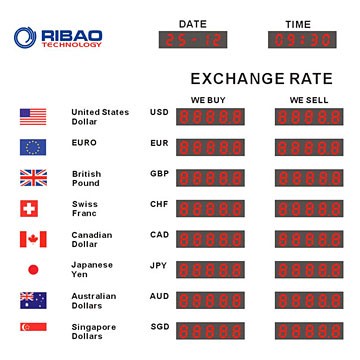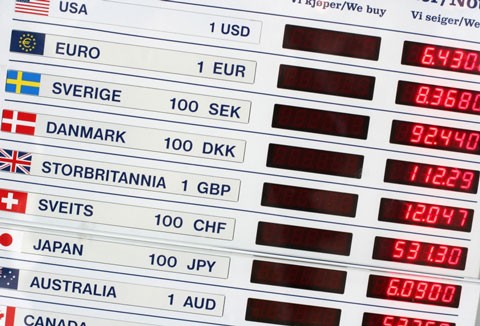Exchange Rates
Post on: 16 Май, 2015 No Comment

Contents
This article defines the term exchange rates. For a discussion of companies impacted by a strengthening or weakening dollar, see The Dollar .
An Exchange Rate is the rate at which one nation’s currency can be exchanged for that of another. Exchange rates impact, and are impacted by, international trade, in a free-market system that helps to maintain a balance of trade and balance of capital. For example, a skewed change rate can make a company’s exports cheaper than their foreign counterparts, but for a country to achieve this artificially they must sell their own currency by borrowing against the nation’s wealth to purchase another nation’s currency. If exports or all capital are in high demand, a country’s currency will rise in value because of the demand for that currency to pay for exported goods, services, and capital. Investors are impacted in two ways:
- Businesses that rely on exports can find their products suddenly competitive — or prohibitively expensive — in overseas markets as exchange rates fluctuate. Similarly, companies that rely on imports can see the costs of these imports rise and fall with the exchange rate. For companies impacted by changes in U.S. Dollar exchange rates, see The Dollar .
- Exchange rates directly affect the realized return on an investment portfolio with overseas holdings. If you own stock in a foreign company and the local currency goes up 10%, the value of your investment goes up 10% even if the stock price doesn’t change at all.
Factors Impacting Exchange Rates
The exchange rate between two countries’ currencies depends upon many factors, including the Balance of Trade or Balance of Capital and the prevailing real interest rate in country as well as inflation.
Imports and Exports are the main drivers of the balances of trade and capital. If the country imports more than it exports, it has to be supplied with capital from abroad.
Relative interest rates greatly impact the exchange rate between any two countries. Typically as the central bank of a country makes a change in that country’s interest rates, investors and trader will see the value of that country’s currency — in relationship to other countries — change. An example of this is as the US Federal Reserve lowered interest rates in the fall of 2007, the value of the US dollar fell both in anticipation and in response. When the public perception starts to change to the point of view that maybe The Fed will stop lowering rates or even increases rates, typically you will see the US Dollar stabilize or rise.
Exchange Rate Movement
Exchange rates, like any other commodity, are based on supply and demand for particular forms of currency.
Supply

Domestic currency supply changes as a result of a country’s fiscal and monetary policies.
Demand
Demand for currency can be influenced by a large number of factors, including interest rates, inflation, and views on impending government regulation.
Importance of Exchange Rates
Exchange Rates are very important for any country as they determine the level of imports and exports. If a domestic currency appreciates with respect to a foreign currency, imported goods will be cheaper in the domestic market and local companies would find that their foreign competitor’s goods become more attractive to customers. If the country has a strong currency then its goods become more expensive in the international market, which results in lost competitiveness. This is the reason that China, despite much pressure from the United States, is not letting its Yuan appreciate. For an importer, such as Nonsolovino, the exchange rate is important because the suppliers in Italy will require payment in euro. To pay these suppliers the business needs to convert — or exchange — pounds for euro. The amount of euro received for each £1 depends on the exchange rate.
What is the exchange rate? An exchange rate is the amount of one currency that has to be given up to acquire another currency. An exchange rate of £1 = €1.30 means that an individual or business has to give up £1 to get €1.30 euro. Exchange rates change every day. When the exchange rate changes this can affect different stakeholders in different ways depending on the direction of the change. The terms ‘strengthened’ and ‘weakened’ are used when exchange rates change and it is important to understand what is meant when an exchange rate has strengthened or weakened. What causes the exchange rate to change
Importance of Exchange Rates for Investors
Exchange rate’ movements can have a significant impact on a company’s returns. Multinational companies may see significant shifts in their profitability, as foreign exchange (FX forex) rates may make locally held currency more valuable. Even local companies can be affected, as changing FX rates may substantially alter their material costs, or affect their ability to sell their goods in foreign countries at competitive prices.
Additionally, investors and fund managers often use these very tools to speculate as well, hoping to profit from fluctuations in exchange rates. MD ![]()














